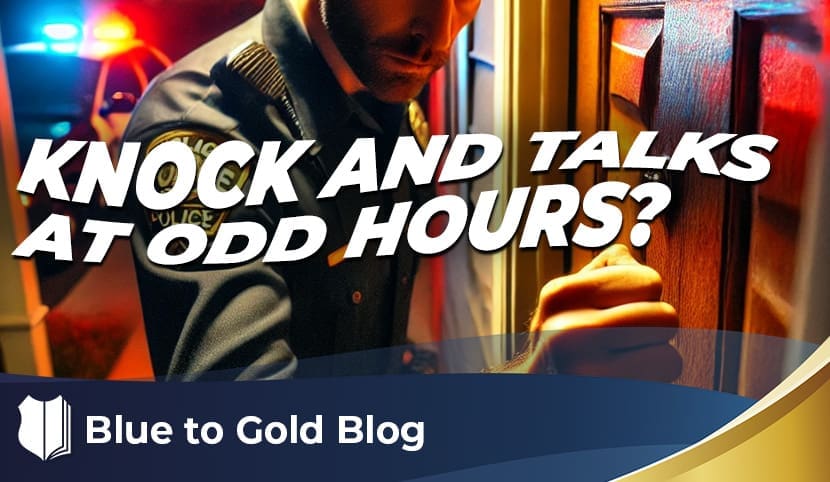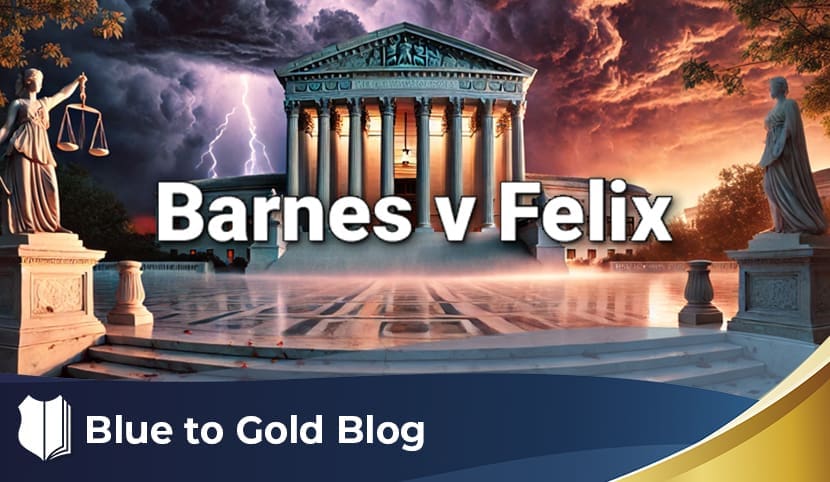Hi, everyone!
Today’s question comes from an officer in Texas who wants clarification on knock and talks. Specifically, the question is:
Can you conduct a knock and talk at odd hours, such as late at night?
The short answer is yes, but only if you have a reason to believe the occupant would be receptive to uninvited guests.
Let’s break this down. My friend in Texas mentioned that he’s seen other videos where I discuss how courts have ruled on this issue. For instance, knocking on someone’s door late at night, claiming it’s a “knock and talk,” may not hold up in court if the circumstances indicate otherwise. If a reasonable person wouldn’t feel free to ignore the police at that time, it’s likely not a knock and talk—it could be considered a detention. Even if the person is inside their home, they may feel compelled to comply, which turns your knock and talk into a constitutional issue.
The Question: Can You Knock Late at Night?
The question is timely because of a recent case from the First Circuit: French v. Morrill (15 F.4th 116, 1st Cir. 2021). Here’s what happened:
A boyfriend and girlfriend, both college students, were in a rocky relationship. After breaking up, the boyfriend began harassing and stalking the girlfriend. They later reconciled as friends—at least, that’s what she wanted. He, however, wanted more.
One night, they argued at her house, and the boyfriend took her cell phone and left. This occurred around 3 a.m. The girlfriend called the police, who believed the boyfriend had stolen the phone. Around 4–5 a.m., officers went to his house and observed lights on inside. Instead of applying for a warrant, they decided to conduct a knock and talk.
The officers entered the property, approached the front porch, knocked on the door, and announced themselves as police. No one answered, so they left.
Was this constitutional?
The court ruled that this initial knock and talk was lawful. The officers did what any member of the public could do, and their actions fell within the knock and talk exception to the warrant requirement.
Key Factors in the Court’s Decision
- Lights Were On: The officers observed that the lights were on inside the house, suggesting the occupant was awake.
- Recent Activity: The officers knew the boyfriend had recently been at the girlfriend’s house, so it was reasonable to believe he was still awake.
- Reasonable Assumption: It was plausible that the occupant might be willing to talk and resolve the matter.
So far, so good. However, the officers didn’t stop there.
When a Knock and Talk Becomes a Violation
The officers returned to the house multiple times—approximately three. On one occasion, the boyfriend opened the blinds, saw the police, and immediately closed them. This was a clear message: He did not want to talk.
Despite this, the officers kept returning and remained on his property. The court ruled that these repeated intrusions violated the Fourth Amendment. Once it became clear that the occupant did not want to engage, the officers had no right to linger on his property or continue knocking.
Qualified Immunity Denied
The court also denied the officers qualified immunity. It found that a reasonable officer in 2021 should have known that their conduct violated the Constitution. As a result, the plaintiff (French) is entitled to damages.
Key Takeaways
- Odd Hours Require Justification: If you conduct a knock and talk late at night, you must articulate why you believe the occupant would be receptive to uninvited guests. For example, lights on or recent activity might justify it.
- Respect Curtilage: If the occupant explicitly or implicitly indicates they don’t want to talk (e.g., by saying “leave” or closing the blinds), you must leave unless exigent circumstances exist.
- Exigent Circumstances Are Critical: Without a warrant, you need exigent circumstances to remain on the property—such as imminent danger, destruction of evidence, or an ongoing emergency.
Practical Advice
If it’s the middle of the night and there’s no indication the person is awake or willing to talk (e.g., no lights, no sounds), don’t conduct a knock and talk. Wait until morning or send an officer on the day shift to follow up. Courts have made it clear: Don’t mess with people’s curtilage without proper justification.
Conclusion
The First Circuit reminds us that we must play by the rules, even during graveyard shifts. If you’re unsure, err on the side of caution. Articulate your reasons for conducting a knock and talk, and if the person refuses to engage, respect their rights and leave.
I hope this helps! Thanks and stay safe out there!








